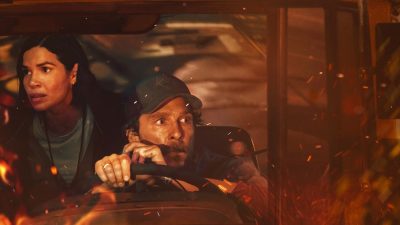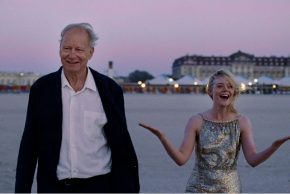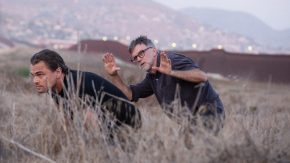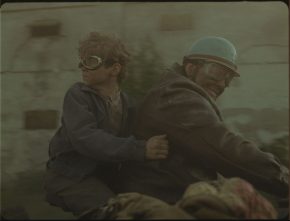Once upon a time I had a friend from Eastern France, not far from the German border. We met on a Stephen King fansite, the since-defunct darktower.net. You know that feeling, like finding a long lost sister? She had a twin sister, but she would say I was more like her twin. I visited her in France multiple times, she visited me in Hungary multiple times, we travelled together to Belgrade, Slovakia and Vienna. We were together through thick and thin, through her breakup with her first great love, through her mother’s cancer, through my time in Israel, then the first half of my Iceland life. It was like being in love, really. I do think there is a fine line between true, deep friendship and romantic love.
Around the first time she came to Hungary the first cracks appeared in our friendship. We had a common friend (let’s just call her Chris), also from dt.net, another Hungarian. Chris and I tried to present this friend from France (I refuse to say French friend, it almost sounds like french fries) a more nuanced image of the country and the history, the bad alongside the good, the homeless people, the unemployment rate, the existential insecurity alongside the tourist kitsch; she wouldn’t have it. She was interested in the tourist kitsch only, the Gypsy romanticism (a running joke with Chris and me ever since), as she would call it: an idealized image of the country she had in her mind that she refused to give up, and that was the first time I got the impression that she regards Hungary, and in fact any country she visits, as a playground, something that’s just there solely for her entertainment. I remember her reaction to an earthquake in Turkey in the early 2000’s. “Don’t worry”, she blithely reassured a common Turkish acquaintance, “I still want to visit Turkey” or words to that effect.
That was the second huge crack. I tried to point out to her why that comment and attitude was inappropriate – she just didn’t get it. In her view, I attacked her for absolutely no reason. Long story short, we kept in touch for approximately ten years, then, around halfway during my four years in Iceland I broke off relations with her. There came a point when I just couldn’t take it anymore (also I was having a bad time with anxiety and depression, which probably didn’t help). To this day she doesn’t understand why I ended it, why I cut her out of my life without a word of explanation. I was thinking of trying to explain, but I know it would be wasted effort. Not because she is stupid, but because she just can’t (and won’t) see past her mental barriers, beyond the privileged, coddled fantasy world she grew up in. I think that’s worse than deliberately being a jerk. I still feel somewhat bad for ghosting her the way I did, but I know that even if I contacted her and we started talking again, she’d say something in her second or third sentence that would make me want to tear my hair out.
I’m not saying that all Westerners are like that (thankfully), but she is a representative of a certain kind. You know the type. The one that goes to tribal dance with the tribesmen of Africa on a Safari, #authentic, #blessed, #lovelife, #nofilter.
She was the one who asked how it made me feel, being a Hungarian, reading Karl Marx’s Communist Manifesto. I mean, surely it must have evoked all kinds of strange, mysterious feelings what with me being a tribeswoman from the mystical, exciting, post-communist Eastern European jungle. I’m not sure what kind of strange, mysterious feelings were expected of me, the only emotion I can report is profound boredom.
All of the above highlight a host of differences between Westerners and Easterners, that I would like to explore in the last part of my essay.
I don’t remember much of growing up behind the Iron Curtain, but unfortunately I’m old enough to remember some of it. Distant as those years are, they still affect my present – not just mine, but the whole region’s – and my experience as a Hungarian and Eastern European living in Western Europe.
I remember only bits and pieces from before the change of the system – not being able to dress up in costume in the carnival season in February because we were a Party kindergarten, and the State found it important to show muscle in the face of a bunch of five year olds. More importantly I remember this intangible yearning for the West, the Promised Land, and how devastated I was when I couldn’t go with my parents to Vienna when they went there to get some financial transaction done that they couldn’t do from home (in those years of the soft dictatorship financial- and household appliances-tourism was the thing – Hungarians flocked to Austria to stock up on electric gadgets and to outsmart bureaucracy at home). To five-year-old me, Vienna felt like the other side of the globe. I came of age after the change of the system, when second hand western stuff and cheap remakes flooded the newborn market economy. The longing was there still as I was growing up, first for the U.S.A., then for Ireland, that feeling of ‘just get the hell out of here’. In the meanwhile I met and made friends with members of that blessed tribe, the Westerners. It was also the first time I experienced what it is like to be treated like a representative of some kind of exotic species: not quite human, similar to us but not quite, maybe a bird of paradise (I refrain from more degrading analogies), what it’s like when others visit your country like they visit the zoo or a theme park, knowing that after a short stint they can return to civilization. You wouldn’t think this is a thing in the middle of Europe, in this day and age (and I’m not claiming Hungarians are any better when visiting abroad, far from it). Of course we cash in on the Westerners visiting the post-Soviet bloc safari, as do all the slightly inferior peoples around the world. You have the Statue Park that hosts the mementoes of the communist era (I vaguely remember passing one of those amazingly hideous ‘works of art’, if you can call them that, on my way to and from kindergarten, but for the most part I’m as much a gaping tourist in there as the next person). You have the House of Terror, a museum dedicated to the fascist and communist regimes; you have thrift shops selling memorabilia, bits and bobs of lives past. As I said I met and made friends with Westerners (and Easterners and Northerners and Southerners), and with that came the first amusing, then, after the third time tiring compulsory rounds. Being asked to speak Hungarian is OK, if only slightly awkward, I mean I can relate, it’s a strange language, not related to anything in Europe (only Finnish maybe, not like you can tell). The hungry Hungarian joke wasn’t funny even for the first time and it seriously needs to go away. You won’t make any friends around here with the hungry Hungarian joke. It just makes me want to shudder, roll my eyes and punch you in the face simultaneously. A shout-out to every Austrian who was ever asked if they came from Australia and vice versa, and to every Turkish person who ever had to suffer the immortal, ineradicable Turkey-turkey joke. Whatever, I don’t want to sound like a snowflake, I accept it is part of the parcel.
Now that I made it, got the hell out of there, am a dweller of the Promised Land (even if I’ll never be a through and through Westerner) I find myself longing for Hungary, especially for Budapest with her lovely old, decrepit houses, cobwebbed light shafts, guano crusted attics.
More from Susan Anwin HERE.

























Comments